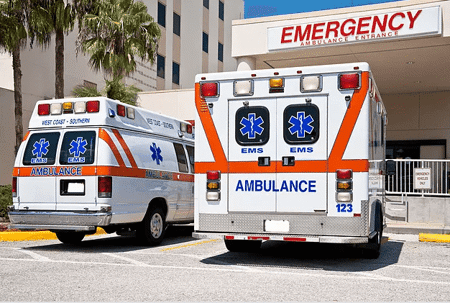Fortunately, few car accidents result in broken bones, lacerations, or unconsciousness. When they do, an ambulance is called and the injured person is taken to the hospital. But what about accidents that don’t result in obvious trauma or injury?
First of all, just because you don’t have a broken bone and aren’t bleeding, doesn’t mean you haven’t suffered a serious injury. And even if you don’t feel hurt right after the accident [read more here], you might feel it two hours later.
So, if the police arrive and ask whether you’ve been injured or need an ambulance, take a moment to assess the situation.
DO NOT:
Tell the officer you feel fine if you don’t feel fine or if you don’t know whether you feel fine (it’s hard to know in the moment what your body is feeling).
Refuse an ambulance ride because of the cost (if the ambulance ride is necessary, the insurance company must cover it).
Ignore what your body is telling you and attempt to tough it out.
DO:
Tell the officer you’re hurt and where it hurts, or that you’re not sure whether you’re hurt.
Accept an ambulance ride regardless of the cost, if you’re hurt.
Listen to what your body is telling you.
While you never want to exaggerate your symptoms or pretend to be more injured than you are (this can damage the value of your case rather than increase it), you must do what’s best for your body. If you’re hurt or might be hurt, it’s best to get checked out immediately. If it hurts to walk, breathe, or drive, get in that ambulance and get evaluated.
If you or someone else can take you to the hospital or another provider, there’s nothing wrong with that. But don’t put it off. Don’t sleep it off. Don’t brush it off. Address it with a medical professional ASAP. Not only is this good for your health, but it’s important documentation for a potential personal injury claim. The last thing you want to hear from the insurance adjuster is that the injury you’re dealing with wasn’t serious or is unrelated to the accident because you didn’t see a doctor until a week later.
If you’ve been injured in an accident, you should consult with a personal injury lawyer to guide you through your claim and treatment. Otherwise, you might be left hurt and holding the bag for someone else’s mistake.

